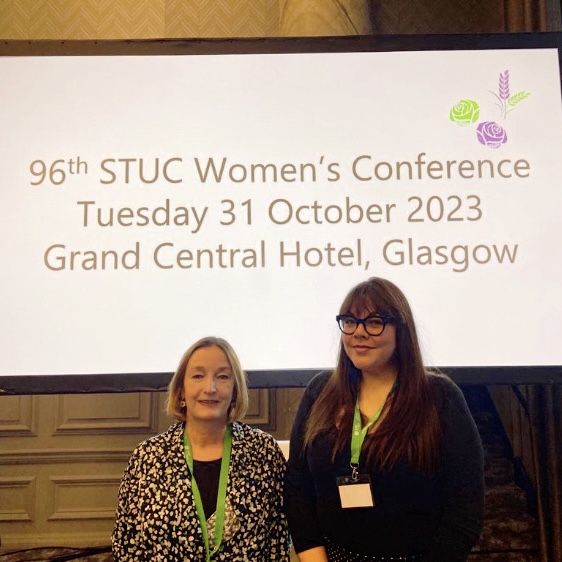Fiona Steele and Kate Powell are representing Aegis at the STUC Women’s Conference this year. The conference is taking place in Glasgow over two days. The theme of the 96th Annual Conference is ‘Herstory, Your Story, Our Story’, highlighting the delegates’ own stories and contributions to trade unions.
On the first day of the conference, Fiona presented Aegis’ motion on the impact of AI on financial services. Moreover, Kate spoke in support of the motion on burnout in the workplace.
The Impact of Artificial Intelligence on Financial Services
The motion regarding the impact of AI in the financial services drew attention to:
a) the danger of automation eliminating white collar and administrative roles held in majority by women;
b) lack of women involved in the decision-making algorithms creating systems with bias built into them by design.
The motion called on the committee to address the imminent risks by working with key stakeholders:
The pace of change in the last 6 months has ramped up significantly and we believe more needs to be done to prepare for its impact on women workers in particular. The predictions of job displacement are frightening – with call centre and customer service roles estimated to drop by 75% as a result of AI.
AI brings opportunities as well as threats. So, we call on the STUC Women’s Committee to work with employers and the Scottish Government to ensure women workers are not left behind. We need to ensure that the opportunities and benefits that AI brings reduces gender inequality in the workplace rather than exacerbates it by building a gendered approach into our responses to AI.
Employee burnout in the workplace
Kate spoke in support of a motion on the issue of employee burnout in the workplace and the detrimental impact it has on workers’ wellbeing and productivity.
The motion contextualized burnout as “a vital factor” in leading to recruitment and retention crisis. Mover and supporters of the motion called on the Committee to work with affiliates for additional support and steps to promote health and wellbeing of employees.
All workplaces must develop and implement a comprehensive strategy that focuses on preventing, identifying, and addressing burnout of staff.
Proactive steps must be taken to promote the health and wellbeing of workers, such as better communication channels between staff and management so any issues or concerns are addressed in a timely and effective manner. Employers must take immediate action to reduce the stress and fatigue that staff are experiencing.
We must see increased investment for staff development and training, to ensure staff are equipped with the necessary skills and knowledge to effectively manage their workloads and mental health.








